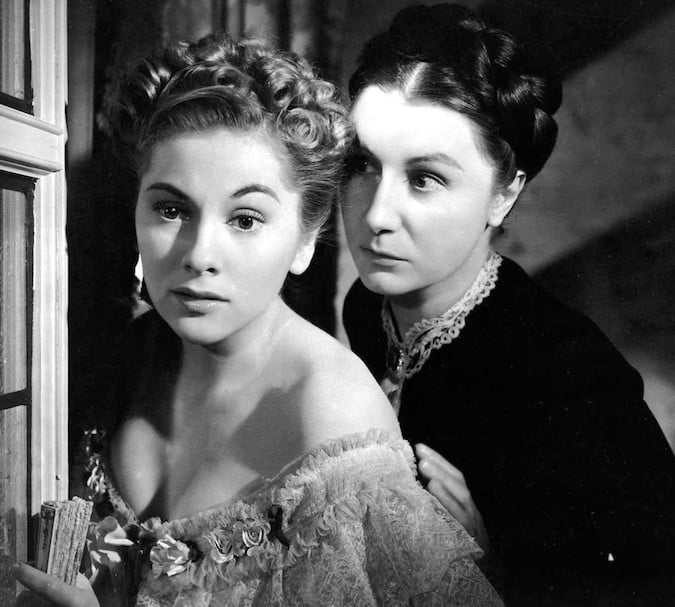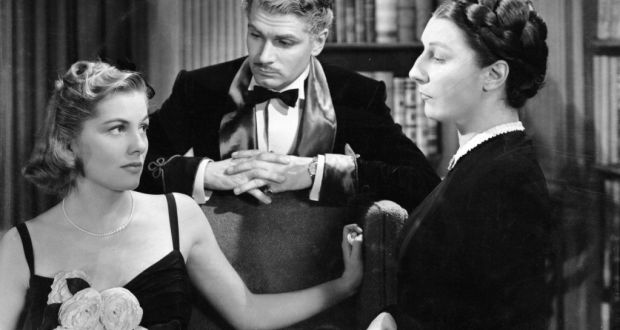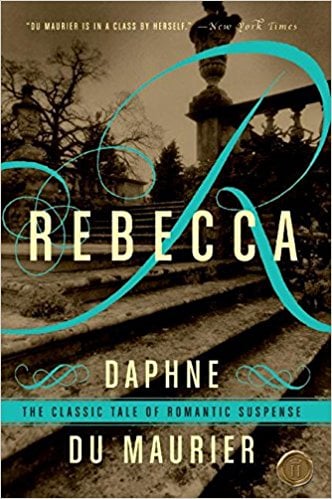Rebecca — 1940 Film Based on the Novel by Daphne du Maurier
By Taylor Jasmine | On December 27, 2017 | Updated June 28, 2022 | Comments (0)

The 1940 film version of Rebecca, based on Daphne du Maurier’s 1938 novel of the same name, was a psychological thriller with nod to the gothic tradition. The black-and-white film, which captured the moody, mysterious feel of the book, was the first American film by director Alfred Hitchcock.
Joan Fontaine starred in the role of the naïve young woman who marries the brooding widower Maxim de Winter, portrayed by Laurence Olivier.
Rebecca, the deceased first wife of de Winter, is never seen in the film, but casts a powerful shadow over the inhabitants of Manderlay castle. The suspense builds until we learn just why that is.
A contemporary analysis of Rebecca
In a 2017 analysis of the film, the aptly named Rebecca Conroy observed of the nameless narrator of Rebecca:
“She dresses up in a gown that Rebecca used to wear, excitedly thinking that she will impress all the guests, only to be shamed and almost killed by her emotions of regret. The ‘little girl’ act (compared to Rebecca’s adult role) is also played out in the way she fearfully sneaks around the hotel to meet Maxim again, one last time, before she leaves to New York …
We do not get the sense that the new bride has a woman’s hand in either her marriage or her home, as neither did Rebecca as it turns out. But she doesn’t know that, and is trained to look up to her puzzling predecessor.
Just as a little girl would listen to a bedtime story, engrossed with all of her mind, this new bride watches her new life at Manderley, and what it brings with it, as if she were being entertained. She is extremely passive in her own life, while a dead woman, Rebecca, is given all attention from all angles of the story.”
Though initially the film didn’t make an enormous amount of money at the box office, it was exceedingly well-received by critics. Hundreds of reviewers named it the best film of 1940. Even among more contemporary critics, Rebecca has a 100% score on Rotten Tomatoes.
A 1940 review of Rebecca
From the March, 1940 review of the film version of Rebecca by Herb Cohn in The Brooklyn Daily Eagle: The vengeful ghost of the first Mrs. de Winter has found an ally in Alfred Hitchcock.
Rebecca never emulates the ghosts of Marley or Hamlet’s father by becoming visible — she warps the lives of her widowed husband and his innocent young bride with a devilish delight that is as compelling as make-believe can be.
. . . . . . . . . .
Joan Fontaine, Laurence Olivier, and Judith Anderson
. . . . . . . . . .
She is an unseen demon who owes her unholy power more to a wizard of the camera than to the vivid imagination of a talented author. The ghost of Rebecca might well be a revelation to Daphne du Maurier herself. She will stand as one of the haunting creations of Hitchcock. For Rebecca is unquestionably the most remarkable film that the British directer has turn out thus far.
But if the conception of the ghost of Manderley Castle is to the credit of Miss du Maurier’s 1938 novel, and the dramatic evaluation of her influence is to the credit of Hitchcock, the expression of that invisible phantom is the triumph of the superb cast that David O. Selznick has assembled.
The film tells the grim and yet tender story of Maxim de Winter and the childish bride he brought from Monte Carlo to the sea-battered coast of Cornwall. There, tragedy had blighted his life as the master of Manderley.
. . . . . . . . . .
Based on the book Rebecca by Daphne du Maurier
. . . . . . . . . .
For it is through Maxim and the nameless girl he made the second Mrs. de Winter, through Ben, the half-witted handyman, and Mrs. Danvers, the sinister housekeeper who cherished Rebecca in death as in life, that the eerie tone of the du Maurier story is set. Through them Rebecca exerts her mastery of the house.
Joan Fontaine brings a stunning modulation of emotions to the second Mrs. de Winter, a naive but sincere young woman who comes to her husband’s Cornish estate to find that her predecessor drowned a year before when her skiff was lost off-shore.
She is still the castle’s mistress by remote control, every object in its somber halls bearing memories of her stewardship, every servant in the household cleaving to the routine she established.
. . . . . . . . . .
. . . . . . . . . .
The shadow of the departed Rebecca comes between her and her husband the moment they lea their Continental honeymoon behind then and drive up the winding road to the steps of Manderley.
Laurence Olivier, fortified by his playing of Heathcliff in 1939’s Wuthering Heights, excels in the role of Maxim de Winter, the stoic man of the world who is struggling under some secret burden. Olivier plays him with determined restraint, preserving the Hitchcock air of mystery throughout, yet making him a pleasant figure with a gracious charm.
. . . . . . . . . .

The nameless young wife and the menacing housekeeper, Mrs. Danvers
. . . . . . . . . .
Judith Anderson portrays Mrs. Danvers, the mystifying housekeeper who constantly taunts her new mistress with abnormally fond memories of the beauty, the breeding, and the brilliance of Rebecca de Winter.
Rebecca is an example of the quality that comes from carefully polished production, with script writers, director, and actors working in unity. It is an overwhelming human drama, psychologically complex, marvelously exhausting, and cinematically unorthodox. Above all, it’s a brilliant display of storytelling, one that does justice to Daphne du Maurier’s original vision.
. . . . . . . . . .
Another 1940 review in The Hollywood Reporter
The 1940 film version of Rebecca received nearly universally laudatory praise. Here’s another from The Hollywood Reporter, originally published on March 21, 1940:
“As a psychological study, the picture is a brilliant effort in its delineation of the tremendous power which the personality of a woman dead continues to exert over the living.
Faithfully preserving the theme and atmosphere of the du Maurier story, it portrays the apparently insuperable barriers which are encountered by the girl who attempts to follow in the footsteps of the deceased Rebecca as the new wife of the man who had permitted Rebecca completely to dominate his home, fighting a seemingly hopeless battle until the dramatic denouement which forever removes the ghostly influence.
Joan Fontaine gives a superb portrayal of the untaught girl who pins her faith on love, and struggles through to victory over the shadows which beset her. Laurence Olivier, too, offers a masterly interpretation of the beleaguered husband. Judith Anderson is almost chilling in the sinister menace she injects into the role of the housekeeper, a brilliant performance.”
Awards and nominations
Rebecca was nominated for 11 Academy Awards and won two — Best Picture for 1940 as well as best cinematography (black and white). Notably, it was nominated for Best Director (Hitchcock), Best Actress (Joan Fontaine), Best Actor (Laurence Olivier), and Best Adapted Screenplay. It also appears on numerous best film lists, including the American Film Institute’s (AFI) 100 Years, 100 Thrills.
. . . . . . . . . .
More about Rebecca , the 1940 film
- Wikipedia
- Rebecca on Filmsite.org
- Rebecca on Rotten Tomatoes
- An Analysis of Alfred Hitchcock’s Thriller, Rebecca
. . . . . . . . . .
*This post contains affiliate links. If the product is purchased by linking through, Literary Ladies Guide receives a modest commission, which helps maintain our site and helps it to continue growing!



Leave a Reply